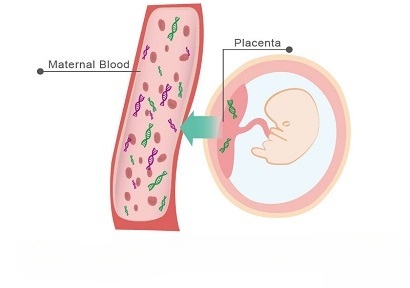What is NIPT ?
NIPT or NIPS (Non-invasive prenatal screening test; cell-free fetal DNA) is a screening test performed on maternal blood, for estimating the risk of common chromosomal problems (an abnormal number of chromosomes), and therefore requires confirmatory invasive testing in cases of high-risk results, also known as screen-positive results. Since it’s a screening test, the term NIPS (Non-invasive prenatal screening test) is a more appropriate term, which is used in this article henceforth.

What are the conditions that NIPS can look for ?
NIPS can look for common chromosomal aneuploidies (Trisomy 21, 18 and 13) and sex chromosomal aneuploidies. It has detection rate of around 99% for Trisomy 21 (Down syndrome).
Why do you need NIPS ?
NIPS helps identify fetuses at risk of serious chromosomal abnormality with better accuracy than any other screening tests. Screen-negative results give reassurance to expecting parents.
When can the NIPS be done?
NIPS can be performed from as early as 10 weeks period of gestation.
Who are the optimal candidates for NIPS ?
- Maternal age more than 35 years at delivery.
- Any pregnant women who want more accurate information regarding common aneuploidies (Trisomy 13, 18, or 21)
- History of previous pregnancy with a Trisomy detectable by cfDNA screening (Trisomy 13, 18, or 21).
- Screen-positive results for aneuploidy that include a first-trimester, or quadruple screen, or presence of isolated, single minor markers on anomaly scan like intracardiac echogenic focus (ICEF), choroid plexus cyst (CPC), pyelectasis (prominent renal pelvis). In situations where the ultrasound is suggestive of major malformation or there is presence of more than one soft marker for Down syndrome, then, diagnostic test like amniocentesis is preferable. However, there may be women who wouldn’t consider termination even in case of baby affected with Down syndrome but still want to have reassurance with NIPS, they can choose to undergo NIPS keeping in mind that other chromosomal abnormalities cannot be ruled out by NIPS.
- Parental balanced Robertsonian translocation with increased risk of fetal Trisomy 21.
Checklist for pretest counseling for NIPS ?
- NIPS appears to be the most accurate screening test for Trisomy 21.
- NIPS does not screen for all chromosomal conditions.
- Women who desire definitive information about chromosomal conditions in their pregnancy should be offered the option of amniocentesis or chorionic villous sampling.
- False-positive and false-negative results do occur with NIPS and all screen-positive cases need confirmation with amniocentesis.
- A negative cell-free DNA result indicates a decreased risk but does not definitively rule out Trisomy 21 or other chromosomal abnormalities.
- All genetic screening is elective; whether a woman chooses to have aneuploidy screening, prenatal diagnostic testing, or no testing is a personal decision, and any of these is a reasonable option.
Reasons for false positive NIPS ?
There can be many reasons for false-positive NIPS result –
- Confined placental mosaicism
- Demise of co-twin in early pregnancy
- Maternal mosaicism
- Maternal cancer
- Maternal chromosomal aberrations or copy number variants in the mother
- Incidental or chance factor
- Technical issues – low fetal fraction, failure of quality-control checks
- Transplant recipient
- Recent blood transfusion.
Reason for false-negative NIPS ?
Confined placental mosaicism, borderline low fetal fraction, maternal copy number variants, technical issues.
Role of NIPS in the case of twins ?
cfDNA-based screening for common Trisomy in either monochorionic or dichorionic twins provides higher positive predictive values compared with traditional serum and NT-based screening in twins but is associated with higher incidence of test failure (no call/false-positive/false-negative).
Role of NIPS in case of vanishing twins?
NIPS is best avoided in cases of vanishing twins, as the DNA from vanishing twin can lead to confounding results.
Role of NIPS in triplets ?
Current professional society guidelines either recommend against or are silent on, NIPS testing in triplets.
Can NIPS be performed in the case of a donor embryo or surrogate mother?
There are different technologies to perform NIPS and some of them can check for aneuploidy in the case of a donor embryo. One needs to check with the lab performing the test before sending the sample.
Can NIPS check for Triploidy ?
NIPS based on SNPs can predict Triploidy, but not the counting method, and hence, it is important to check with the lab before sending the sample for NIPS, in case the clinician is suspecting Triploidy.
What is extended NIPS ?
Extended NIPS is based on next-generation sequencing and can look for microdeletions or copy number variations. The positive predictive value (PPV) of extended NIPS for copy number variations detected other than the common aneuploidies is around 6%, however, it holds the promise to pick much more abnormalities with better detection rates and better PPV. One needs to discuss the advantages and limitations of the test with the patient before concluding which test will be best for that particular patient.

